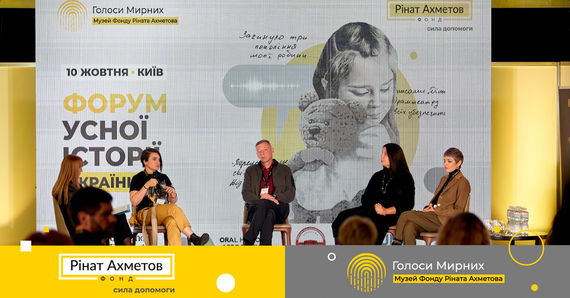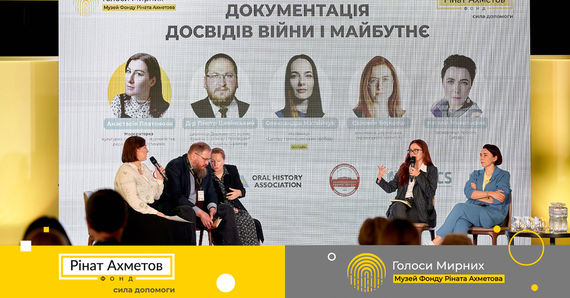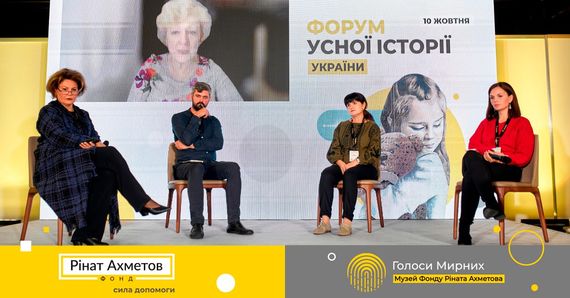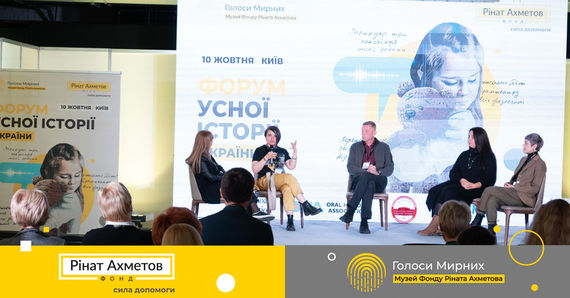Forum of Oral History of Ukraine: Challenges and Pain Points in Documenting Wartime Experiences

The first Forum of Oral History of Ukraine was held in Kyiv at the initiative of the Museum of Civilian Voices of the Rinat Akhmetov Foundation. The participants in one of its panel discussions Oral History: Tasks, Roles, Problematique talked about some “bottlenecks” and pain points in the documentation of wartime experiences and the role of the Ukrainian experience for global documenting practices.
The event was held in partnership with the USC Shoah Foundation and the Oral History Association, Taras Shevchenko National University of Kyiv, and Maria Curie-Skłodowska University (Lublin).
Janine di Giovanni, war correspondent, author, co-founder, and executive director of The Reckoning Project, talked about how interviewers working with someone else’s pain can avoid re-traumatizing the interviewee and traumatizing themselves.
“Sometimes you have to try to do the interview several times until the interviewed person feels safe. Never attempt to conduct an interview at the scene of the attack – the interviewee must be taken to a safe place. Psychologists or social workers should be involved when you work with children. Stay safe and take care of yourself physically and emotionally.”
Natalya Yemchenko, Public Relations and Communications Director at SCM and a member of the Supervisory Board of the Rinat Akhmetov Foundation, spoke about the importance of preparation for the interview, responsibility to the person who shared his or her story, and supervision of the interviewers themselves. She also touched upon the challenges associated with the collection of evidence.
“The huge challenge is the conflict between the methodological correctness, ethics, speed, and quantity. A balance can be found in collaboration between academics and practitioners, methodologists and those working in the field. The second is a capacity issue. Many initiatives arose out of certain drive or courage, and now the big challenge is not to lose what has already been done, not to lose the existing capacity.”
Iryna Lopatina, a representative of The Reckoning Project, spoke about her own experience of being traumatized while collecting numerous wartime stories, told from the first person.
“We were always taught never to imagine the footage or scenes of what we heard. You should not allow yourself to scroll through these images in your mind. Yet, I allowed it and had some flashbacks for several weeks. How to prevent this? To take care of yourself. You have to be very attentive to yourself, to your emotions, be honest with yourself and stop in due time.”
Katya Taylor, curator, cultural manager, founder of the Port of Culture NGO, emphasized the importance of art in living through the experiences of the war.
“We are all in a permanent state of burnout now. Art is very helpful in addressing this. Art therapy is a separate large practice that includes both body practices and work in the community so that a person could feel, if not better, then differently. Such practices should be integrated into our lives on a permanent basis.”
Andriy Dubchak, war correspondent and founder of Donbas Frontliner, spoke about why he considers photography to be the most universal language for information transmission during the war.
“In today’s world, a person has a very short time for consuming information. That is why short forms, such as photographs, in which everything is clear emotionally, are about the transmission of real-life experience, one of the important parts of the transmission of information about Ukraine. When people look at a photograph and believe in it, they compare their own experiences with what they see, and draw conclusions.”
At the end of the discussion, moderator Yuliya Manukyan, journalist, editor, researcher, co-founder of Urban Republic NGO, quoted one of the Forum speakers, Oleksandra Matviychuk from the Center for Civil Liberties:
“We are documenting not the violations of the Geneva or Hague Conventions. We are documenting human pain.”
The initiative to hold the Forum belongs to the Rinat Akhmetov Foundation’s Museum of Civilian Voices, which documents testimonies of civilians about the war told from the first person. The Museum has now collected more than 85,000 stories. Follow the news about the event on the Museum’s website: https://civilvoicesmuseum.org/news



